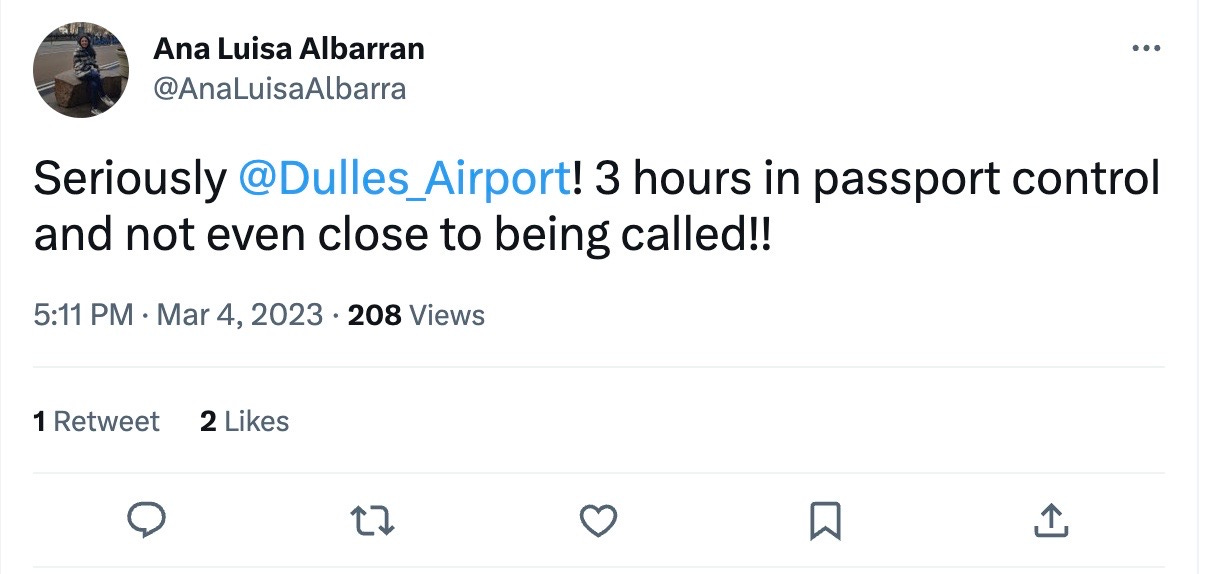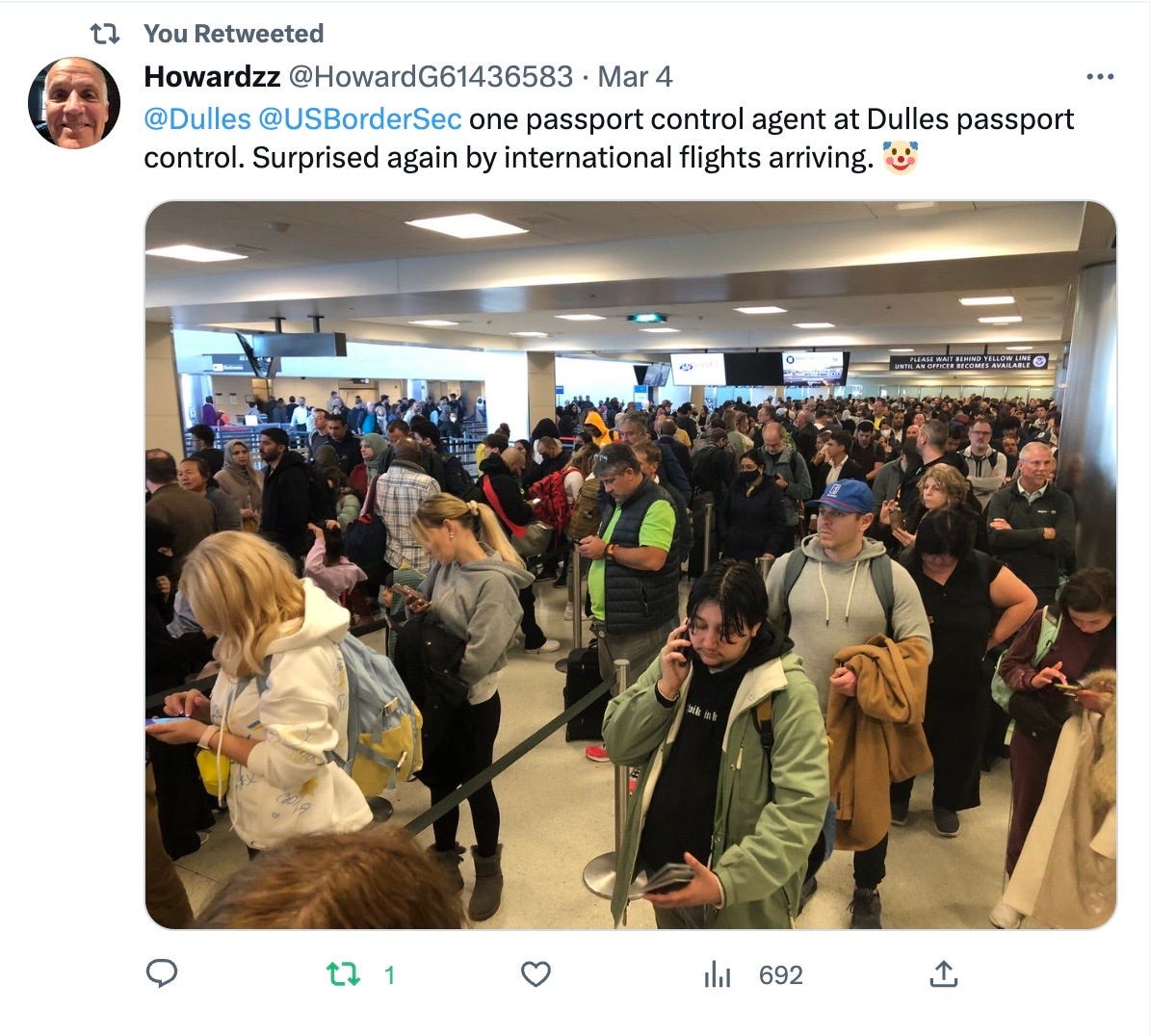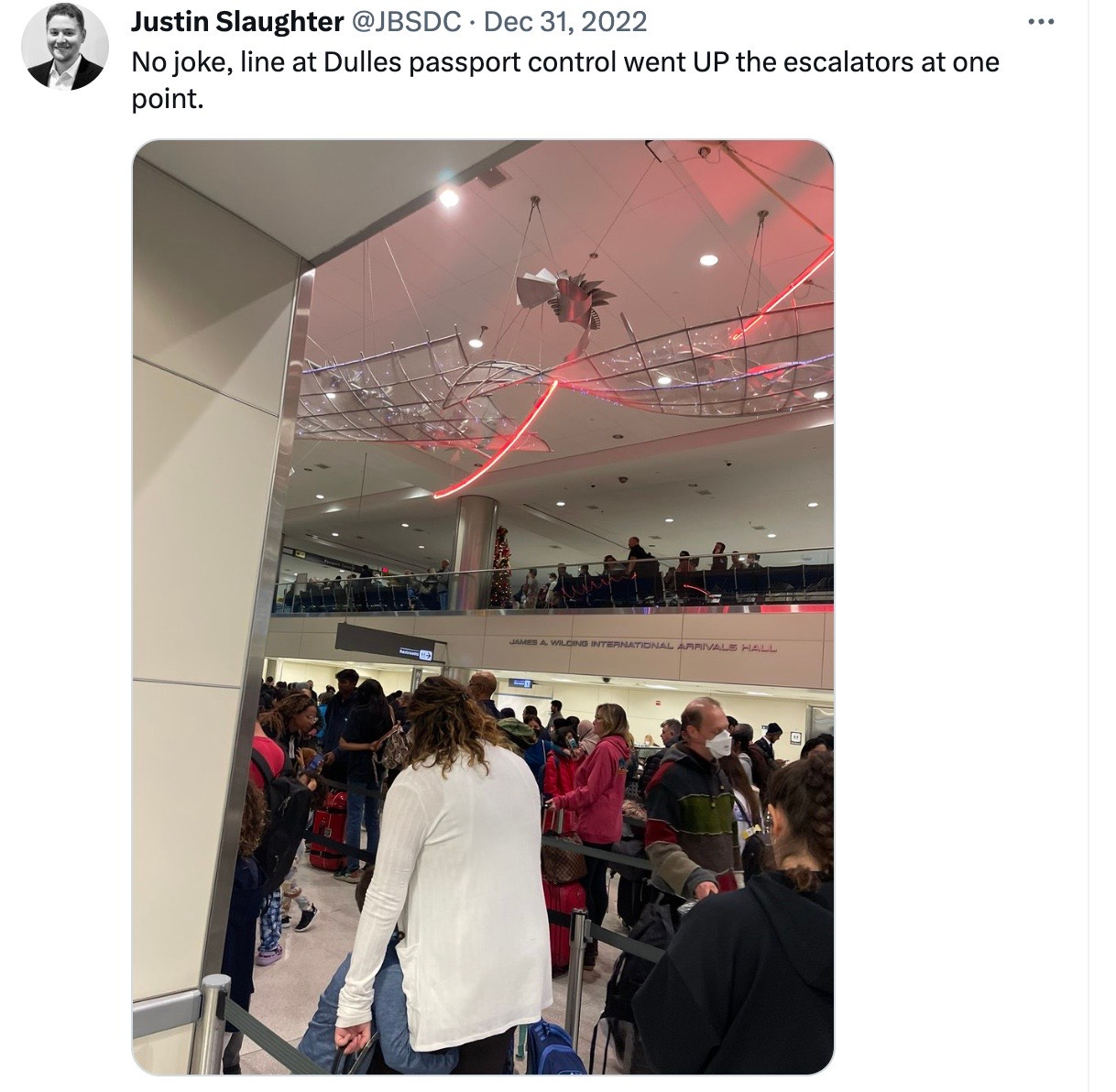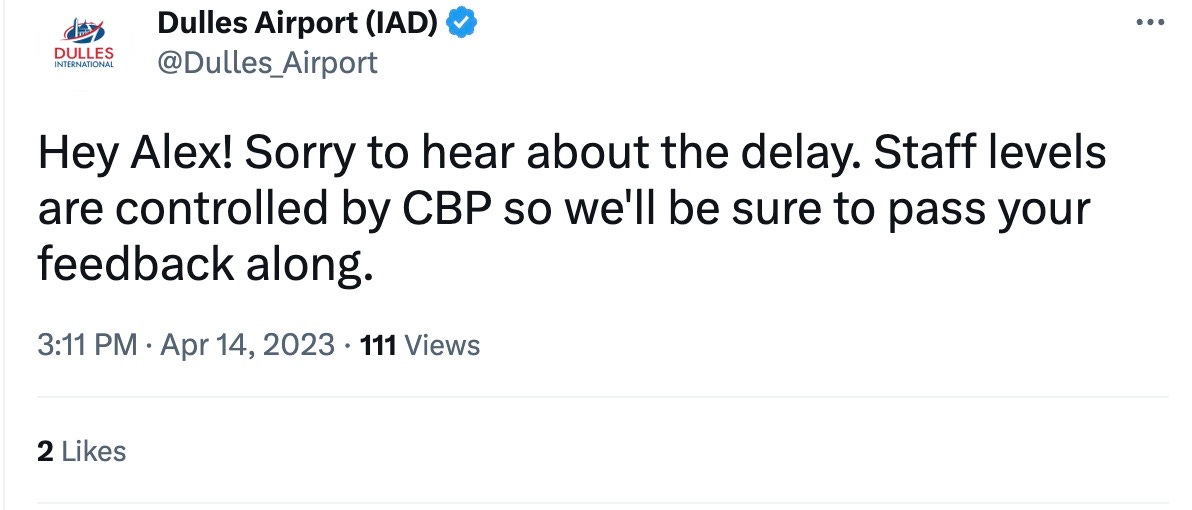The Travesty of Dulles Airport Passport Control
An extended rant about the worst airport in America
Dear The War On Prices subscribers,
Last week, the Washington Examiner published an op-ed by me on the national embarrassment of Dulles airport’s passport control. I got tons of feedback and horrendous anecdotes of others’ experiences. And given I’ve got a lot to say on the subject (and have been digging through a ton of data), I thought it would be worth publishing my full, original op-ed draft below for you guys….
Ryan
—
Dulles Airport Passport Control Is A National Embarrassment
Welcome to America: land of the free, home of the brave, and, in Washington D.C., the purgatory of passport control lines. At Northern Virginia’s Dulles Airport, thousands of weary travelers these days are greeted with a first impression of a country that's less "amber waves of grain" and more "snaking queues of disdain."
As wait times grow unbearable and Customs and Border Protection (CBP) indifference becomes palpable, there’s one question I keep pondering: does anyone actually want to solve the problem?
The last three times I’ve disembarked Dulles’ awful Star Wars cantina-like mobile lounges to passport control, the lines have been 90-minutes plus long. That’s, sadly, no longer unusual. Official stats show that from April 1, 2022 to March 31, 2023, there were 348 days with maximum waiting times of over an hour, 233 days of over 90 minutes, and 98 days where some people were slinking around the hall for two hours or more. Judging by the Twitter anger and recollections of queuers, the official maximum wait time recorded each day often substantially understates what passengers say they actually experience. People regularly report three,
four,
and sometimes even five hour lines:
However skeptical I am about the official numbers, even they suggest CBP management seems perennially surprised that flights arrive as scheduled. That, or they just don’t care. Individual officers are often helpful and diligent, but there simply aren’t enough to serve passengers’ needs, with afternoon and evening periods regularly and severely under-staffed. My January 2 experience saw, at most, eight officers working, and just two at one stage, serving non-priority lanes filled with thousands of people from eight flights. CBP’s own data, bizarrely, recorded at least 11 open booths throughout my two-hour stay. Again, the official stats and passengers’ “lived experience” are often at odds. The tweet below is not untypical.
It needn't be and wasn’t always this way. Not much works well in the UK right now, but at London Heathrow, people sail through the electronic gates in no time. Back in 2015, return travelers to the U.S. at Dulles on ESTAs could similarly use computer kiosks to speed things up, offering their finger prints, before quickly being waved through by an officer. This freed up spaces for passengers that required seeing an officer, but this option no longer exists. So even official wait times have surged to the maximum of three hours, 27 minutes this past year, exacerbated by the fact there are now fewer open booths to access at peak times than pre-pandemic.
The economic losses of these queues is staggering. Consider the American Bar Association Antitrust Law Section's recent 71st conference in D.C., attended by high-end lawyers and economists whose hourly bills for time can reach thousands. Many of these professionals arriving languished in passport lines for around two hours, with their valuable time and potential client work evaporating like morning dew. Add up these missed opportunities across weekly delays and across all passengers, and it soon becomes clear that the passport control line is not just an inconvenience, but an economic black hole.
Passengers in these lines, I’d wager, would be willing to pay not insignificant sums to avoid them. When economists see huge lines like this in a market, they should rightfully conclude: the price is wrong. When it’s a function of central planning of something so easy to plan for, it’s torturous.
It’s not just the work and output losses either. There’s the discomfort and lost social time. Passengers scheduling pick-ups are at a loss in informing taxis and friends, who also wait around. The line moves just enough that you can never restfully sit, leaving older passengers and young children standing for hours, while those travelling alone must worry about navigating bathroom breaks without losing their spot in line. So much time is wasted in the hall that European travelers are often forced to sacrifice the possibility of seeing friends and family on the first night of their short trips. And then, just when they think salvation is near and access to the States imminent, they’re faced by a bunch of annoying, self-important Dulles staff who inexplicably jumble up the line order by sending them to stand in new, painful mini-queues.
All this waiting, by the way, applies to American citizens as well as foreign visitors. Yet as most don’t fly internationally often, and most international travelers don’t come to D.C. often, people usually write off their experiences as atypical - just a “bad day” at the airport. But search “passport line Dulles” on Twitter, read Reddit’s “Passport Control at Dulles,” or examine the CBP’s data. Things are far worse than in 2015 and 2016 and are obviously deteriorating. The only thing more predictable than the long lines at Dulles these days are the generic protestations of the airport’s social media accounts and staff that this is not their fault. Don’t worry, they’ll be sure to pass on your feedback to their colleagues at CBP.
So bad is the situation, that frequent travelers increasingly resort to drastic evasive measures to avoid Dulles’ misery. Some, like myself, now try to do indirect flights with layovers in Dublin, where one can go through U.S. passport control and then just spend an hour in a more pleasant terminal. Others fly to alternative U.S. inbound airports like BWI, or just avoid coming to D.C. altogether. The fact that travelers are reaching for such absurd tactics highlights how damaging the long lines really are.
The CBP promotes its “Mobile Passport Control” app to avoid these queues, but it sometimes doesn’t work, is only for U.S. and Canadian citizens, and if widely used, would just displace the problem. Paying for Global Entry is obviously another option, but it's unavailable to many countries’ citizens and requires difficult-to-schedule initial appointments or else even longer waits at a U.S. entry airport for the induction interview. (Believe me, I’ve tried). In any case, anecdotal reports suggest that even that is no guarantor of rapid passage at Dulles these days.
Ultimately, the situation is untenable, wasteful, and getting worse. Yet nobody seems to care. You’d think these economic and social costs, coupled with the damage to the airport and capital’s reputation, would invoke some soul-searching. But no. Rather than calibrating officer numbers with passenger flow, the CBP seems unmoved. Until whatever is causing this staffing and scheduling problem is resolved, Dulles remains a demoralizing gateway to America - a bureaucratic black hole sapping the spirit of even the most cheerful traveler.










Hmm. I guess I've been lucky. But is it more than not being able to hire enough agents in a tight labor market? My vague notion is that Congress has not allowed increases in civil servant salaries to even keep pace with inflation in recent years.